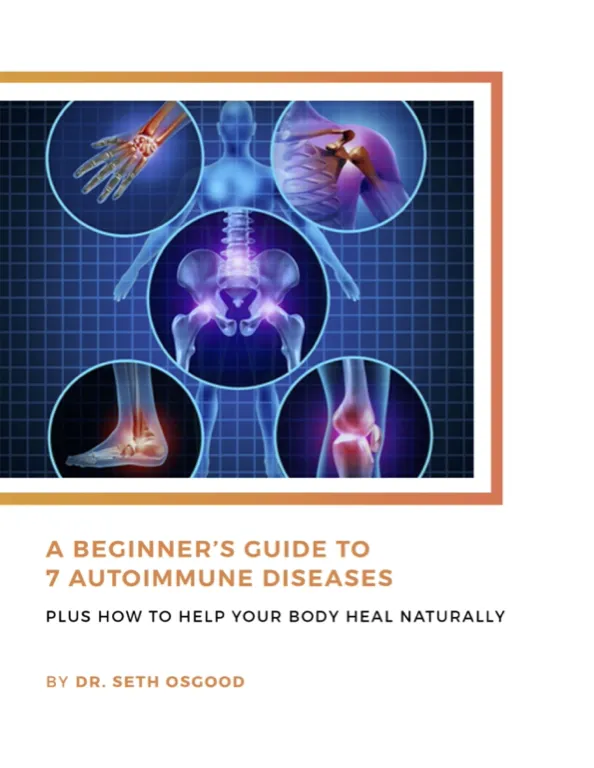In order for your immune system to function optimally, it needs the right fuel.
It relies on key vitamins and minerals to mount a proper defense against threats, while also keeping inflammation and oxidative stress in check. Without sufficient fuel, it can become strained and begin to misfire, attacking your own tissues and causing an autoimmune disease.
Fortunately, restoring optimal levels of these nutrients is one of the quickest and easiest ways to see improvements in your symptoms while working through a whole-body approach to recovery.
Here are the 7 most common deficiencies I see in autoimmune patients, what to know about testing, and sample lab results from an actual autoimmune patient.
7 Nutrient Deficiencies Linked to Autoimmune Disease
1. Magnesium
Magnesium is a necessary contributor for over 300 enzymes in the human body, including enzymes that synthesize DNA and RNA. It’s important for methylation, which is a key detoxification process, and the metabolism of calcium, potassium, and vitamins C, E, and B complex.
Chronic stress and high-sugar diets are known to deplete magnesium levels, so many people are deficient in this mineral.
2. Selenium
Although lesser known, this mineral plays a big role in modulating inflammation levels. It protects against several inflammatory cytokines and regulates the production of inflammation-signaling molecules. It’s also important for the function of T cells and natural killer cells.
3. Vitamin D
Regulatory T cells, which differentiate “self” cells from outside cells depend on vitamin D, making it critical for autoimmune patients. Deficiencies have been linked to rheumatoid arthritis and other autoimmune conditions.
In my experience, patients who are low in vitamin D (which is a fat-soluble vitamin) also tend to be lacking in the other fat-soluble vitamins, including A, K, and E. This is why I recently introduced a new supplement called ADK Elite that combines all four of these essential nutrients at levels shown to be therapeutically effective.
4. Vitamin A
Your gut lining relies on vitamin A to regenerate its mucosal barrier. That may sound gross, but it’s what keeps your gut from becoming damaged and leaky (a known cause of autoimmunity). It also promotes the normal function of cytokines, which are chemical messengers that regulate inflammation.
5. B Vitamins
Vitamins B6, B9, and B12 are required for healthy energy, immune function, and proper methylation. Many autoimmune patients have mutations at the MTHFR gene that inhibit the conversion of B vitamins.
6. Zinc
Zinc is essential for the production of white blood cells and helps regulate gut permeability. Like magnesium, it’s used in many key processes throughout the body, including protein and DNA synthesis, gene expression, and enzymatic reactions.
It’s considered an essential nutrient, meaning your body can’t produce or store it so you require a constant supply through your diet.
7. Iron
Iron plays an important role in protecting against oxidative stress because it’s part of a molecule called heme. It’s also a necessary cofactor in a number of enzymes and is needed to metabolize B vitamins.
Iron deficiency is particularly common in patients with autoimmune thyroid conditions (Hashimoto’s or Graves’ disease) and is linked to thyroid-related hair loss and fatigue.
Testing & Treatment for Nutrient Deficiencies
When it comes to nutrient deficiencies, there are three important things to keep in mind.
1. Test, don’t guess
I see patients all the time who’ve spent hundreds of dollars on supplements they didn’t need, or that didn’t contain the right levels of nutrients, all while missing out on what they do need, just because their doctors didn’t order nutritional testing.
2. Look at digestion and absorption
Even if you are eating all of the nutrients you need or taking them in supplement form, you may not be absorbing them if you’re dealing with leaky gut, low stomach acid, or gut infections. If there are signs of these imbalances, it’s important to test and treat them alongside deficiencies.
3. Focus on food
I believe that food, not supplements, should be our primary focus when it comes to nutrition. The vitamins and minerals in food are in their most natural state and the form our bodies were designed to absorb.
Supplements can be a helpful tool to get back on track and there are a few foundational ones I recommend for everyone (multivitamin, Omega 3s, and a probiotic), but long term we want to rely on nutrient-dense food as much as possible.
Sample Lab Results from an Autoimmune Patient
Here’s a behind-the-scenes look at the tests I use in the GrassRoots Adaptation Program to evaluate patients’ nutritional status. These are real results from one of our autoimmune patients.
Armed with this in-depth data, we can implement a personalized dietary and supplement protocol that targets exactly what you’re missing, without wasting money on supplements you don’t need.
About the Author: Dr. Seth Osgood is a Doctor of Nursing Practice, Board Certified Family Nurse Practitioner and Institute of Functional Medicine (IFM) Certified Practitioner. Dr. Osgood received his post-graduate training in Functional Medicine through the IFM and from working with Dr. Amy Myers. He has helped people from around the world improve their health utilizing a Functional Medicine approach.
Want to work with Dr. Osgood and the GrassRoots team? Become a patient in our West Lebanon, New Hampshire Functional Medicine clinic, our Burlington, Vermont Functional Medicine clinic, or our Austin, Texas Functional Medicine clinic!





